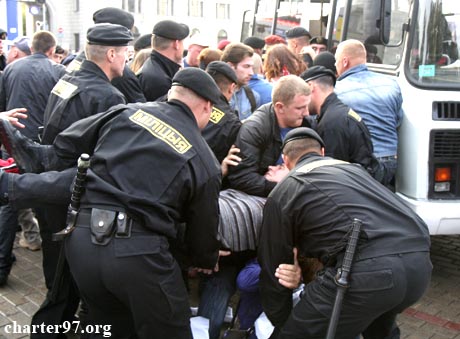In the very beginning Aleh Hulak, Belarusian Helsinki Committee, Valiantsin Stefanovich and Ales Bialiatski, HR Centre Viasna/Spring, stressed the importance of Universal Periodic Review procedures as a new mechanism of defending human rights in UN; UPR was introduced in 2006.
Aleh Hulak noted that the main document for the review has to be prepared by the Belarusian authorities. However, the text is not available to public yet. Mr Hulak said that it was difficult to predict which manner it would be written.
Alternative source
The report prepared by human rights defenders would also be a part of the review procedure as an alternative source.
Their document had already been presented to several embassies in Belarus. The authorities had undoubtedly familiarised themselves with the text, HR defenders shared.
Moreover, there had been several meetings with state officials prior to writing the alternative report. Mr Hulak recalled a visit to Natallia Piatkevich, a deputy chief of the Presidential Administration, who is considered to be the main state ideology architect in Belarus.
He characterised the meeting as “innerving and lacking [will for] a constructive dialogue.”
HR defenders considered such behaviour of the authorities as a Soviet legacy in understanding the human rights defence in the society. It is mainly associated with something illegal if not sanctioned from the top.
No secondary problems
During his part of the presentation Valiantsin Stefanovich confessed that the main challenge in a report preparation was its size.
Indeed, HR defenders had only 10 pages to express their vision of the human rights situation in the country. “That was why we were to choose the main problems. Yet in human rights there are no primary and secondary problems,” underlined Mr Stefanovich.
Nevertheless, they thought necessary to present in UN problems concerning the right to life, Belarus still practices death penalty, and political rights. Elaborating on the situation with death penalty HR defenders stressed the urgency of introducing the moratorium.
Recommendations should not remain on paper
Concluding the presentation Ales Bialiatski accentuated the importance of attracting the attention of international community to human rights problems in Belarus.
In his opinion nowadays the country has to react and listen more to opinions expressed by international organisations and institutions, because it is somewhat more open to cooperation with the EU.
HR defenders were hoping that UN recommendations for Belarus after having gone through UPR would not remain on the paper and would get transferred into real and concrete actions.





